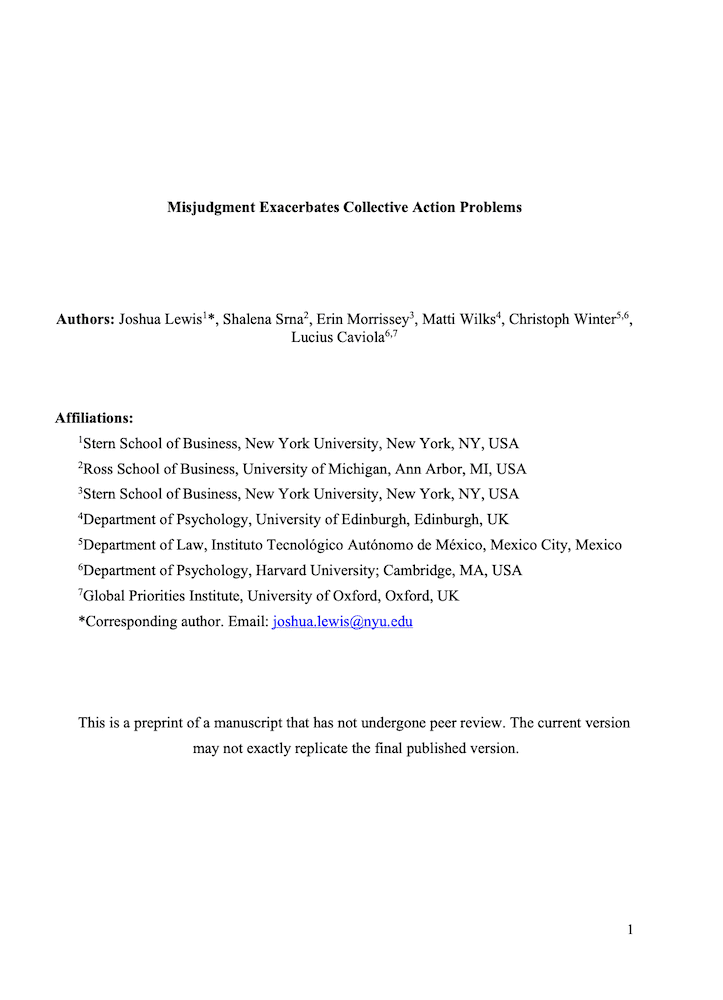Misjudgment Exacerbates Collective Action Problems
Joshua Lewis (New York University), Shalena Srna (University of Michigan), Erin Morrissey (New York University), Matti Wilks (University of Edinburgh), Christoph Winter (Instituto Tecnológico Autónomo de México and Harvard Univeristy) and Lucius Caviola (Global Priorities Institute, University of Oxford)
GPI Working Paper No. 2-2024
In collective action problems, suboptimal collective outcomes arise from each individual optimizing their own wellbeing. Past work assumes individuals do this because they care more about themselves than others. Yet, other factors could also contribute. We examine the role of empirical beliefs. Our results suggest people underestimate individual impact on collective problems. When collective action seems worthwhile, individual action often does not, even if the expected ratio of costs to benefits is the same. It is as if people believe “one person can’t make a difference.” We term this the collective action bias. It results from a fundamental feature of cognition: people find it hard to appreciate the impact of action that is on a much smaller scale than the problem it affects. We document this bias across nine experiments. It affects elected policymakers’ policy judgments. It affects lawyers’ and judges’ interpretation of a climate policy lawsuit. It occurs in both individualist and collectivist sample populations and in both adults and children. Finally, it influences real decisions about how others should use their money. These findings highlight the critical challenge of collective action problems. Without government intervention, not only will many individuals exacerbate collective problems due to self-interest, but even the most altruistic individuals may contribute due to misjudgment.
Other working papers
The unexpected value of the future – Hayden Wilkinson (Global Priorities Institute, University of Oxford)
Various philosophers accept moral views that are impartial, additive, and risk-neutral with respect to betterness. But, if that risk neutrality is spelt out according to expected value theory alone, such views face a dire reductio ad absurdum. If the expected sum of value in humanity’s future is undefined—if, e.g., the probability distribution over possible values of the future resembles the Pasadena game, or a Cauchy distribution—then those views say that no real-world option is ever better than any other. And, as I argue…
Future Suffering and the Non-Identity Problem – Theron Pummer (University of St Andrews)
I present and explore a new version of the Person-Affecting View, according to which reasons to do an act depend wholly on what would be said for or against this act from the points of view of particular individuals. According to my view, (i) there is a morally requiring reason not to bring about lives insofar as they contain suffering (negative welfare), (ii) there is no morally requiring reason to bring about lives insofar as they contain happiness (positive welfare), but (iii) there is a permitting reason to bring about lives insofar as they…
Aggregating Small Risks of Serious Harms – Tomi Francis (Global Priorities Institute, University of Oxford)
According to Partial Aggregation, a serious harm can be outweighed by a large number of somewhat less serious harms, but can outweigh any number of trivial harms. In this paper, I address the question of how we should extend Partial Aggregation to cases of risk, and especially to cases involving small risks of serious harms. I argue that, contrary to the most popular versions of the ex ante and ex post views, we should sometimes prevent a small risk that a large number of people will suffer serious harms rather than prevent…

